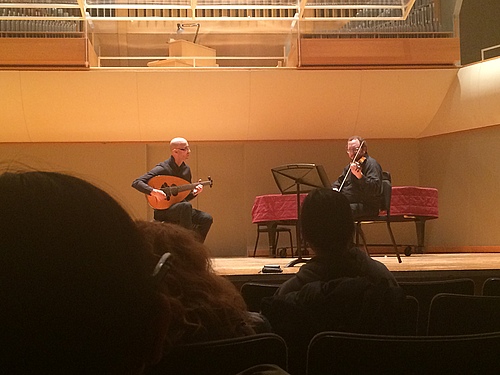This week, there were several events outside of the actual classroom that fit directly with what I’ve been learning about and what I am interested in. My Arabic professor screened “Return to Homs” in the Weitz theater. It was an incredibly powerful documentary depicting the origins of the Syrian rebellion. I was absolutely shocked at the amount of footage they were able to capture. The movie although first filming peaceful protests with chants-moved rapidly to filming airstrikes, sniper fire etc. When the film was being made it wasn’t expected that this would turn into such a violent revolution, but in fact it did. Instead of just packing up when it got dangerous, the film-makers decided to stay. Although it was incredibly risky, in the end they were able to produce real live footage of the atrocities that happened in Homs for the entire world to know and see.
I’m not sure if I ‘enjoyed’ the movie (because this isn’t really the type of thing one watches for entertainment and enjoyment). However, I really felt like the movie gave me a lot to think about and a much greater understanding of the events in Syria. It was also particularly powerful because I am currently tutoring English to a Syrian refugee, whose home city of Aleppo went through similar atrocities (more on this tutoring experience for a later post.) The movie was so incredibly horrific that it could have just as easily been some type of action thriller. But it wasn’t, the footage was entirely real-and also in only the recent past. The reality of this all just came crashing to the forefront of my mind as I watched these rebels, in their passion and anguish, attempt to survive in a war torn city. When I hear the Arabic words that I’ve learned in class used in these circumstances, I think about the intersection between Arabic language and culture. Yes, these are just words, but hearing them used in these contexts gives them a greater significance. This is a really difficult point to convey. Suffice to say I enjoyed understanding bits and pieces of the movie in Arabic because it connected the words learned in the class to the real world.
This same week a renowned oud player (originally from Syria) named Essam Rafea came to Carleton to perform. He was absolutely incredible. I got some of my close friends to come with me and they too thoroughly enjoyed the concert. His music also seemed to be different from what I think of typical traditional Arabic music. He occasionally did all sorts of things with the instrument (like strumming what looked to be sort of like chords?) that I had previously never seen done on the oud. I was also amazed by his ability to make it all seem effortless and graceful (when I know firsthand how difficult playing the oud can be). He was able to play these incredibly complex phrases very softly (something that at this point I am woefully incapable of doing). After his own solo work, one of my arabic professors (the same one who is teaching me the oud currently) performed alongside him with the violin. They were fantastic, together creating an interactive dynamic in the music. I was able to record a short sample of Essam and my professor playing together. ***ALAS I CAN NOT FIGURE OUT HOW TO UPLOAD IT-STAY TUNED!***

My professor told me that at my next oud lesson Essam would be there to help. I was both excited and very nervous. I practiced a ton leading up to this lesson, but in the end-my practice wasn’t really all that necessary/beneficial. The lesson went phenomenally. Essam gave me tips about my technique and form while playing. Within half an hour I could really feel a difference in my playing-even if it was just playing all of the open strings! Both my professor and Essam were incredibly kind and helpful to me despite my obvious beginner status at the oud. As a side note Essam spoke Arabic with my professor (and a little to me as well), and I really got a kick out of being able to understand a sizable portion of it. It’s thrilling to understand Arabic in an informal context, in contrast to the classroom setting! This point highlights what I think might be one of my favorite parts of learning a language: getting a deeper understanding of the corresponding culture. Learning Arabic has allowed me to gain this greater understanding of both the culture and the history of the region. It seems I’m really falling in love with this culture which drives me to learn more and more of the language itself.
